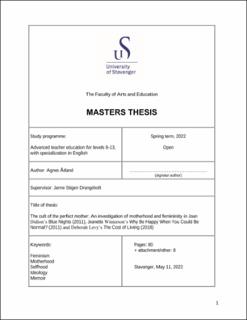| dc.description.abstract | This thesis takes its point of departure in the recognition that contemporary literary representations of female selfhood and motherhood are permeated by a neoliberal discourse of false idealizations, which can be traced all the way back to the ideas proposed by the eighteenth-century Enlightenment philosopher Jean-Jacques Rousseau. Since Rousseau laid the grounds for the domestic ideology of the nineteenth-century, femininity has been based on a false mythification depicting the natural woman as a selfless object that is destined for motherhood. As a result of this deep entangling, the demands of maternal perfectionism and dedication still have a powerful hold on our consciousness. This has led to a naturalized cult of motherhood to favor both an inauthentic and idealized maternal discourse above an authentic and realistic one.
This thesis postulates that while individual narratives are informed by the cult of motherhood, they can simultaneously be employed to combat, probe and challenge the established structures. This thesis will address the female subjection to – and rebellion against – the dominating discourse through a close reading of Joan Didion’s Blue Nights (2011), Jeanette Winterson’s Why Be Happy When You Could Be Normal? (2011) and Deborah Levy’s The Cost of Living (2018). The analysis will be undertaken in dialogue with feminist psychoanalytic theory in order to unpack and explore how the narratives simultaneously uphold and criticize the ideals of motherhood which are essential to female identity. This extends, moreover, to how they formulate a sense of being both a woman and a mother that might be free and authentic, while also ambiguously struggling with the ideological implications of the cult of motherhood. | |
